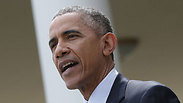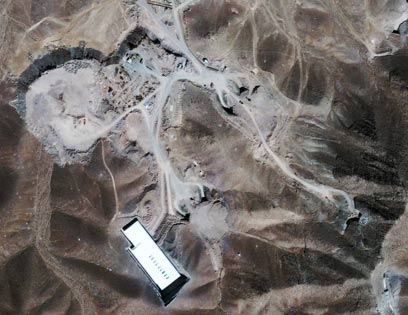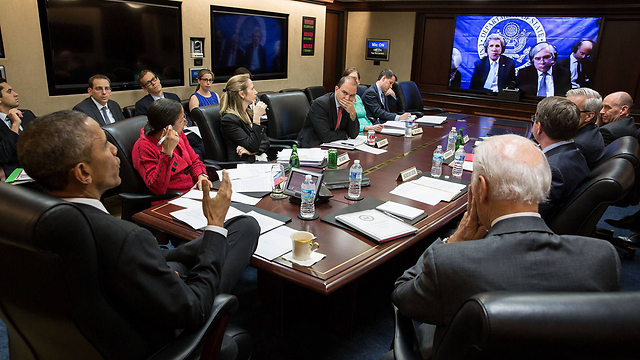
US upgraded ‘bunker-buster’ bombs as nuke talks with Iran advanced
Report says US worked to create weapon that could destroy Iran's nuclear facilities if negotiations failed as talks were taking place; reports says top Obama aides and officials split regarding deal.
WASHINGTON - The Wall Street Journal said on Friday that the Pentagon has been upgrading the biggest bunker-buster bomb in its arsenal as talks with Iran continued over Tehran's nuclear program, readying a weapon that could destroy Iran's facilities if negotiations failed.
Work to improve the design, guidance systems and anti-jamming capabilities on the so-called Massive Ordnance Penetrator began before the latest round of negotiations with Iran started. The most recent test of the 30,000-pound device was in mid-January, the Journal said.
The bomb was created to give US President Obama options for attacking fortified facilities like Iran's Fordow nuclear installation, which is built into a mountain, or one of it's two underground nuclear weapons facilities - one near the city of Natanz and the other on a mountainside near the city of Qom.

Iran's Qom facility (Photo: AP)
“The Pentagon continues to be focused on being able to provide military options for Iran if needed,” a senior US official was quoted as saying. “We have not taken our eyes off the ball.”
Related stories:
- 'Framework' for final deal reached at Iran nuclear talks
- US to give Israel thousands of 'bunker-buster' bombs
- US experiment: Pentagon destroys replica of underground nuclear facility
Nonetheless, officials note that even a destructive attack on Iran’s nuclear facilities would only set its nuclear program back a few years. “You can destroy hardware. But if you have the human capital, programs can be rebuilt,” a military official reportedly said.
Israel has long threatened to launch a military strike against Iran's nuclear facilities – an option the US has largely been objected to.
Split over Iran
Meanwhile, POLITICO reported that Obama's aides are split on the Iranian deal, with some saying it will usher in a new era of regional politics and others saying it will only encourage Iran's regional aspirations.
“At one end of the spectrum is a view is that a deal increases Iranian standing in the region and frees up resources to pursue policies antithetical to our own,” said Matthew Waxman, a former senior national security official in George W. Bush's administration, now a Columbia Law School professor.
“At the other end is a view that it could strengthen moderate political forces within Iran and open up possibilities for warmer Iranian relations with the West,” Waxman said.
“So many proponents of the deal have argued that there will be a spillover effect — that if we can get this deal then we would be likely to alter Iran’s trajectory on its regional approach as well as its domestic policies,” Suzanne Maloney, an Iran expert at the Brookings Institution, was quoted as saying.
“I don’t tend to think that’s the case. There are plenty of reasons to question how this deal is going to play out with regard to Iran on the other issues of concern to the US,” she said.
“If there’s an agreement, that gives Rouhani a lot of wind at his sails. Internally, the pragmatists pick up a lot of juice,” Ilan Goldenberg, a former official in the Obama's State and Defense departments, told POLITICO.
The tentative agreement, struck on Thursday after eight days of talks between Iran and six world powers in Lausanne, Switzerland, clears the way for a settlement to allay Western fears that Iran could build an atomic bomb, with economic sanctions on Tehran being lifted in return.
It marks the most significant step towards rapprochement between Washington and Tehran since the 1979 Iranian revolution, and could potentially end decades of international isolation, with far-reaching political consequences in the Middle East.
In a televised speech on Friday, Iranian President Hassan Rouhani, a relative moderate elected in a landslide two years ago on a promise to reduce Iran's isolation, said the nuclear talks were just the start of a broader policy of opening up.
"This is a first step towards productive interactions with the world," he said.
The agreement angered Washington's closest regional ally, Israel. Prime Minister Benjamin Netanyahu declared it could lead to nuclear proliferation, war and even his country's destruction. Israel believes Iran's goal is to destroy it.
Netanyahu, who has the ear of Republicans who control both houses of the US Congress, said the powers negotiating with Iran must add a new demand that Tehran specifically recognize Israel's right to exist.
It appeared Netanyahu's demand would be unlikely to be taken up, even if the Obama administration is sympathetic to his concerns. Asked whether its inclusion in the final deal would be appropriate, State Department spokeswoman Marie Harf told reporters in Washington:
"This is an agreement that is only about the nuclear issue. We have purposefully kept that separate from every other issue. This is an agreement that doesn't deal with any other issues, nor should it. And that's what we're focused on."
Asked about Netanyahu's demand, White House spokesman Eric Schultz said he had not seen the request but was aware of Israel's ongoing concerns. "We understand his position," Schultz told reporters. "The president would never sign onto a deal that he felt was a threat to the state of Israel."
Reuters contributed to this report












